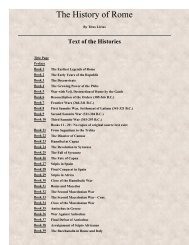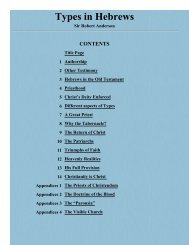The Person of the Holy Spirit - Table of Contents
The Person of the Holy Spirit - Table of Contents
The Person of the Holy Spirit - Table of Contents
Create successful ePaper yourself
Turn your PDF publications into a flip-book with our unique Google optimized e-Paper software.
prophetic in <strong>the</strong> wide sense <strong>of</strong> being a message from God. <strong>The</strong> work <strong>of</strong> <strong>the</strong> <strong>Holy</strong> <strong>Spirit</strong> is thus extended not only to <strong>the</strong><br />
aspect <strong>of</strong> revelation but also to <strong>the</strong> inspiration <strong>of</strong> <strong>the</strong> written Word.<br />
<strong>The</strong> Scriptures are clear, <strong>the</strong>n, both as to <strong>the</strong> fact <strong>of</strong> inspiration and as to <strong>the</strong> agent <strong>of</strong> inspiration, <strong>the</strong> <strong>Holy</strong> <strong>Spirit</strong>. <strong>The</strong> pro<strong>of</strong>s<br />
are abundant for both. As Pr<strong>of</strong>. James B. Green says, “<strong>The</strong> Law and <strong>the</strong> Prophets, <strong>the</strong> teaching <strong>of</strong> Jesus and <strong>the</strong> preaching <strong>of</strong><br />
Paul; <strong>the</strong>se are declared to be <strong>the</strong> Word <strong>of</strong> God. It has been estimated that <strong>the</strong> Bible in various ways asserts its own<br />
inspiration some three thousand times. How <strong>of</strong>ten does <strong>the</strong> Bible have to say a thing before men will believe it?”8<br />
2. <strong>The</strong> Extent <strong>of</strong> Inspiration.<br />
An examination into <strong>the</strong> records <strong>of</strong> <strong>the</strong> Old Testament will reveal literature <strong>of</strong> all types: history, poetry, drama, sermons,<br />
love stories, and insight into <strong>the</strong> innermost devotional thoughts <strong>of</strong> <strong>the</strong> writers. It is a matter <strong>of</strong> great significance that<br />
inspiration extends to all <strong>of</strong> <strong>the</strong>se kinds <strong>of</strong> literature, without regard as to form or style, without concern as to <strong>the</strong> origin or<br />
<strong>the</strong> knowledge embodied in writing. <strong>The</strong> question naturally presents itself concerning <strong>the</strong> relation <strong>of</strong> inspiration to various<br />
portions <strong>of</strong> Scripture.<br />
Every attempt to fathom <strong>the</strong> supernatural is doomed to a measure <strong>of</strong> failure. Man has no criterion by which to judge that<br />
which transcends our experience. Without trying to explain inspiration, an examination <strong>of</strong> its application may be undertaken.<br />
At least seven types <strong>of</strong> operation may be observed in <strong>the</strong> work <strong>of</strong> inspiration.<br />
(1) <strong>The</strong> Unknown Past. Scripture occasionally speaks with authority concerning <strong>the</strong> past in such detail and upon such <strong>the</strong>mes<br />
as would be unknown to man. In <strong>the</strong> early chapters <strong>of</strong> Genesis, for instance, Moses portrays events occurring before <strong>the</strong><br />
creation <strong>of</strong> man, <strong>the</strong>refore beyond all possible bounds <strong>of</strong> tradition. In Isaiah and Ezekiel, reference is made to events in<br />
heaven outside <strong>the</strong> sphere <strong>of</strong> man’s knowledge and prior to his creation. It is clear that <strong>the</strong>se narratives demand both a<br />
revelation concerning <strong>the</strong> facts and <strong>the</strong> work <strong>of</strong> <strong>the</strong> <strong>Holy</strong> <strong>Spirit</strong> in inspiration to guarantee <strong>the</strong>ir accurate statement. Some<br />
have advanced <strong>the</strong> idea in relation to <strong>the</strong> accounts <strong>of</strong> creation that <strong>the</strong>se are similar in many details to pagan accounts <strong>of</strong><br />
creation. It is possible that revelation was given prior to <strong>the</strong> writing <strong>of</strong> Scripture on <strong>the</strong> subject <strong>of</strong> creation, and that men had<br />
added to and altered this revelation in <strong>the</strong> formation <strong>of</strong> non-scriptural accounts <strong>of</strong> creation. <strong>The</strong> existence <strong>of</strong> o<strong>the</strong>r records <strong>of</strong><br />
creation and points <strong>of</strong> similarity <strong>of</strong> <strong>the</strong>se with <strong>the</strong> Scriptures in no wise affects <strong>the</strong> inspiration <strong>of</strong> Genesis. Whe<strong>the</strong>r Moses<br />
used documents or not has no bearing on <strong>the</strong> writing <strong>of</strong> <strong>the</strong> Scriptures. Whe<strong>the</strong>r documents were used, whe<strong>the</strong>r <strong>the</strong>re was<br />
knowledge <strong>of</strong> pagan ideas <strong>of</strong> creation, or whe<strong>the</strong>r tradition had contributed some truth on <strong>the</strong> subject, <strong>the</strong> work <strong>of</strong> inspiration<br />
was necessary in any event to distinguish truth from error and to incorporate in <strong>the</strong> record all that was true and to omit all<br />
that was false. Without doubt, <strong>the</strong> primary source <strong>of</strong> information was direct revelation, and <strong>the</strong> documents if any and such<br />
traditional accounts as may have been known by Moses were quite incidental.<br />
(2) History. A large portion <strong>of</strong> <strong>the</strong> Old Testament conforms to <strong>the</strong> pattern <strong>of</strong> history. In such sections, <strong>the</strong> writer is speaking<br />
about events known to many and concerning which o<strong>the</strong>r documents not inspired may have been written. In many cases, <strong>the</strong><br />
writer is dealing with contemporary events in which <strong>the</strong> element <strong>of</strong> revelation is practically absent. How may inspiration be<br />
said to operate in such Scripture? As in all Scripture, inspiration is not concerned with <strong>the</strong> source <strong>of</strong> <strong>the</strong> facts but only with<br />
<strong>the</strong>ir accurate statement. In <strong>the</strong> record <strong>of</strong> history, <strong>the</strong> <strong>Holy</strong> <strong>Spirit</strong> guided <strong>the</strong> writers in <strong>the</strong> selection <strong>of</strong> events to be noted, <strong>the</strong><br />
proper statement <strong>of</strong> <strong>the</strong> history <strong>of</strong> <strong>the</strong>se events, and <strong>the</strong> omission <strong>of</strong> all that should not be included. <strong>The</strong> result is an infallibly<br />
accurate account <strong>of</strong> what happened with <strong>the</strong> emphasis on <strong>the</strong> events important to <strong>the</strong> mind <strong>of</strong> God.<br />
(3) Law. Certain portions <strong>of</strong> <strong>the</strong> Old Testament consist in laws governing various phases <strong>of</strong> individual and national life. This<br />
kind <strong>of</strong> Scripture is found chiefly in <strong>the</strong> Pentateuch, where <strong>the</strong> law is revealed in three major divisions: <strong>the</strong> commandments,<br />
governing <strong>the</strong> moral life <strong>of</strong> <strong>the</strong> people; <strong>the</strong> ordinances, governing <strong>the</strong> religious life <strong>of</strong> <strong>the</strong> people; and <strong>the</strong> judgments, dealing<br />
with <strong>the</strong> social life <strong>of</strong> <strong>the</strong> people. In some cases, <strong>the</strong> law consisted in commandments given by means <strong>of</strong> dictation, <strong>the</strong> laws<br />
retaining in every particular <strong>the</strong> character <strong>of</strong> being spoken by God. In o<strong>the</strong>r cases, Moses charges <strong>the</strong> people as God’s<br />
prophet and gives commandments which can hardly be construed to have been committed to him by way <strong>of</strong> dictation; yet<br />
<strong>the</strong> commandments have equal force with o<strong>the</strong>r commandments. Inspiration operates in <strong>the</strong> writing <strong>of</strong> all law in <strong>the</strong><br />
Scriptures to <strong>the</strong> end that <strong>the</strong> laws perfectly express <strong>the</strong> mind <strong>of</strong> God for <strong>the</strong> people to whom <strong>the</strong>y are given; <strong>the</strong> laws are








